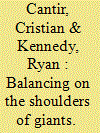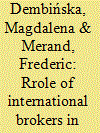| Srl | Item |
| 1 |
ID:
141654


|
|
|
|
|
| Summary/Abstract |
“Soft balancing” has emerged as a way to reconcile realist theory with the lack of hard balancing behavior against US hegemony. Scholars continue, however, to disagree on the concept's utility and causes. Consistent with its realist roots, scholars have primarily focused on power imbalance and external threat to security as causes of soft balancing. This article analyzes Moldova's major foreign policy shift in the mid-2000s. It argues that this was a clear example of soft balancing and that it adds several important insights into the causes of soft balancing. While the power imbalance and external threat from Russia were persistent throughout Moldova's post-independence history, the country only adopted a soft balancing strategy once Russia posed a threat to the internal stability of the government and changes in EU policy created a permissive international environment for the strategy. Moreover, we argue that the domestic political environment played a key role in enabling the adoption of this strategy. This article therefore diversifies the analysis of the causes of soft balancing and provides a theoretical answer for the puzzle of Moldova's pro-Western turn in 2003.
|
|
|
|
|
|
|
|
|
|
|
|
|
|
|
|
| 2 |
ID:
163161


|
|
|
|
|
| Summary/Abstract |
The “frozen” conflict between Moldova and its separatist Transnistrian region—which developed into a de facto state—is dynamic. Despite an active nation-building project to support Transnistria’s independence and a stated willingness to join Russia, Transnistria is juggling between Russia and Europe. While economically dependent on the former’s subsidies and security guarantees, Transnistrian economic ties with the West are growing strong. While most studies are interested in the geopolitical game and the role of external actors, this article argues for a complementary approach that links macro- with meso-level analysis through the role of externally oriented domestic agents. First, the article shows that Transnistria pursues dual alignment in order to survive and provide the population with public goods for which they need external resources. Although Transnistria relies heavily on its patron state, Russia, facing recurrent crisis and external constraints, it has to search for complementary sources of income. Dual alignment is the result of this “multiple asymmetric dependence.” Second, the article argues that local intermingled economic and political interests, embodied by businessmen with close ties not only to Russia but also to Europe, account for how this balancing act is sustained. These informal international brokers or “double agents” mobilize their political connections to support dual alignment while using their Western and Eastern business connections to consolidate their power in Transnistria. It is further argued that the role of international brokers embedded in Russian and European networks and engaging in cross-border cooperation helps understand why the Transnistrian frozen conflict seems to be withering
|
|
|
|
|
|
|
|
|
|
|
|
|
|
|
|